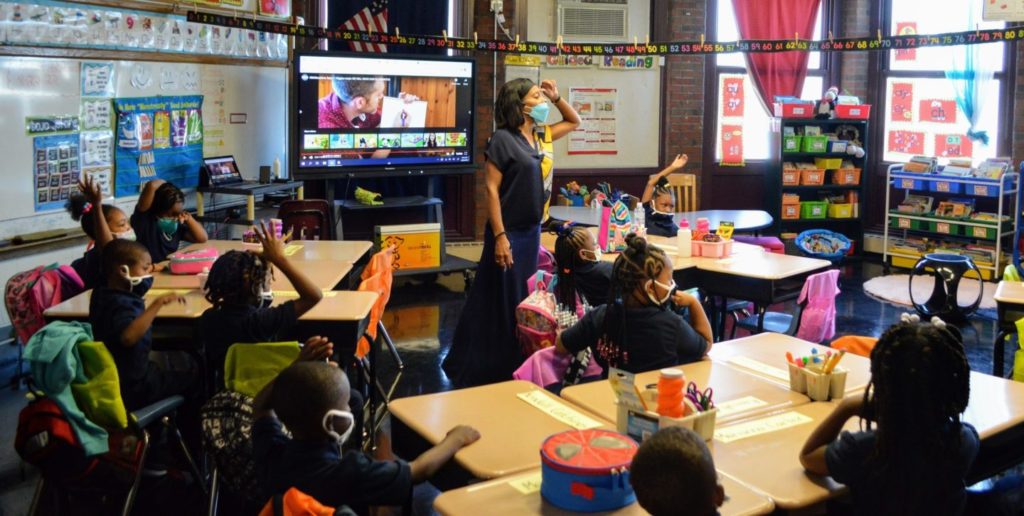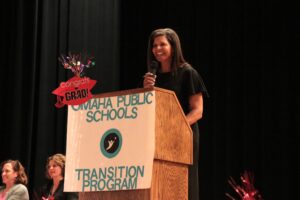School admin group’s ‘equity-focused’ education plan aims to police ‘microaggressions,’ shaming in the classroom
(Daily Caller News Foundation) – A national education initiative that is sweeping the country pushes public schools to embed equity into its practices, encouraging educators to eliminate so-called…

(Daily Caller News Foundation) – A national education initiative that is sweeping the country pushes public schools to embed equity into its practices, encouraging educators to eliminate so-called microaggressions, according to documents reviewed by the Daily Caller News Foundation.
Learning 2025, a program created by the American Association of School Administrators (AASA), aims to create an education system where teachers prioritize a student’s physical, emotional and spiritual development, and is being piloted in more than 120 school districts across the country. The initiative has encouraged educators to axe all “exclusionary or shaming practices,” while a Learning 2025 seminar, viewed by the DCNF, featured several speakers suggesting that teachers axe tardy slips and move to an academic model that veers away from grades altogether.
The AASA’s Learning 2025 aims to redesign public schools to make the entire education system focus on serving the “social, emotional, cognitive, mental health and trauma-based needs” of all students, according to the organization’s website. Through the program’s remake of public school systems, it aims to have all students and staff “served with equity.”
Moreover, the initiative suggests racially balancing the teacher workforce to achieve these goals, arguing that there must be a “diverse educator pipeline” so teachers reflect the demographics of the student body and are able to give “culturally-responsive” lessons.
Over 120 districts were piloting the AASA’s Learning 2025 curriculum in 2022, according to EdWeek, an outlet that focuses on K-12 education. Of those school districts, 13 were recognized for implementing the AASA’s Learning 2025 curriculum the best.
Similarly, a 2021 report detailing the goals of the program suggests that school systems adopt a “whole learner” framework, which focuses the education system on a student’s social, emotional and cognitive needs within the classroom, rather than the instructional material.
As a part of the “whole learner” framework, the report suggests that a child learns the best when they feel “physically, emotionally and identity safe.” In an effort to attain this, school systems should axe “bullying or microaggressions, unfair discipline practices” and “exclusionary or shaming practices,” the report states.
The report touts “a learner-centered, life-span view of growth” within children which is personalized to whatever “social, emotional and cognitive” need a student has. To achieve that, school systems do not need “more assessments” or tests, but rather need to do more with the metrics they have.
The first AASA’s Learning 2025 national summit convened in June 2022 and featured more than 70 sessions to teach the goals of the initiative, according to a press release from Baldwin Union Free School District, a school system recognized for demonstrating the AASA’s Learning 2025 curriculum in an exemplary manner.
Additionally, in January, the Grable Foundation, a non-profit focused on funding outcomes for children, sponsored a Learning 2025 seminar for several schools within Pennsylvania. Teachers who attended the conference could receive credit required for reaccreditation, an email obtained by the DCNF showed.
AASA created Learning 2025 in response to the COVID-19 pandemic in an effort to create a “student-centered, equity-focused” public education system by 2025, according to the organization. The program’s “holistic” approach prioritizes a student’s social and emotional well being, a practice know as Social Emotional Learning (SEL), which has recently come under scrutiny for being a gateway to Critical Race Theory lessons entering the classroom.
To illustrate why tardy slips should be axed, Tami Johnson, a Cajon Valley Union School District counselor and a speaker at the January AASA Learning 2025 seminar, recounted a student’s testimony of embarrassment after receiving a tardy slip.
In the student’s testimony, which Johnson read during the seminar, the child is peppered with comments from teachers upon arriving to class, such as “we’ve already started,” “the warm up is on the board” and “get your assignment out.”
Johnson encouraged educators to eliminate ways or systems that cause the feeling of shame from schools, footage of the seminar shows.
“Shame has no place in our schools,” Johnson states in the recording. “Not in our classrooms. Not in the way we welcome children. But what if pink [tardy slips] changed? Be a pink color changer with me today. What if we welcomed students like this? ‘We are glad you’re here. Tami is here. There are 390 minutes [in a school day].’
Children might be late to school not because their “family doesn’t care about school,” but because there are other issues educators can’t see such as homelessness, Johnson says in her presentation.
“But if we make the assumption about their story, maybe there were some other things that we don’t know,” Johnson said during the seminar. “Maybe there is domestic violence in the home and the child didn’t get enough sleep. Maybe there is child abuse. Maybe the family spent all night looking for another couch to sleep on. Maybe the family spent all the time at the McDonald’s until they knew they had to sleep in their car. Or maybe they just overslept. Maybe the family is committed to too many things right now and it’s that struggle. We make a lot of assumptions. So one of the things that we know about kids, is that we can’t separate the child, the student from the family and their experiences together collectively.”
In April, all “Western Pennsylvania Learning 2025 Districts” received grants from the Grable Foundation to be put towards “whole learner” projects that adjust the school system to the individual student, according to documents obtained by the DCNF.
One school planned to use their grant to develop a “badge” system because the school district does not have grades due to needing a “different approach to transcripts,” documents obtained by the DCNF show. Through a comprehensive curriculum, the badges correspond with an “assessment of skills.”
In addition to axing tardy slips, Johnson encouraged educators, using a presentation slide that read “shame reinforces failure,” to “stop shaming kids” by asking them about their grades, the recording showed.
“I call [students] in one by one. I am going to have this really awesome sheet that talks me through what I am supposed to say to them, and the first question was, ‘do you know your GPA? Did you know you are failing?’ I am here to say that there has never been one kid who came into my office that went, ‘Wow! I had no idea. Really?’” Johnson said. “But this is what I actually experienced: the heckling down [and] shame. Or, I got this, ‘well my teacher hates me. I hate that class. I don’t care about school.’”
Rather than discussing grades with students, Johnson explained that she instead asks students about their strengths and values in an effort to direct students towards their interests at school, the seminar shows.
During a panel at the Learning 2025 seminar, Nerel Winter, a speaker and a California high school principal, noted that his school does not have teachers but instead has “advisors” that primarily focus on “knowing students really well.” Winter also touted to educators a “competency-based” model which focuses on learning over time and helping students who fail classes.
“Our model focus is on the competency-based model, and the way we explain it to parents is what do you do with a scholar [student] who never turns in any work, who never participates in class and bombs your final exam? What grade do they receive in high school? F,” Winter said at the seminar. “And I’ve seen scholars who come into our school with an F in P.E. What happens if you have an F on your transcript? Your chances of getting into a top tier university are basically gone. Are we okay with that? Is this system appropriate for knowing our scholars very well?”
“So [the] competency-based model is focused on learning over time, iterations over time [and] understanding who our scholars are [and] being able to reflect on their learning capability,” Winter continued during the seminar.
The Learning 2025 program has been previously criticized for its similarities to the Centers for Disease Control and Prevention’s (CDC) Whole School, Whole Community, Whole Child (WSCC) educational framework, Fox News Digital reported. The CDC’s “whole child” model focuses on psychological and social services to help educators determine how to best aid students in their development, a practice that parents and advocates have criticized for overstepping parental rights and have considered apart of SEL programing.
The AASA Learning 2025 initiative previously came under fire for its use of artificial intelligence within the classroom to “monitor and measure many skills that were traditionally not assessed because there was no way to do so,” Fox News Digital reported. At a Learning 2025 conference, educators were encouraged to use GPT-3 to help students do classwork and homework.
Johnson declined to comment and the AASA, the Grable Foundation and Winter did not immediately respond to the DCNF’s request for comment.



